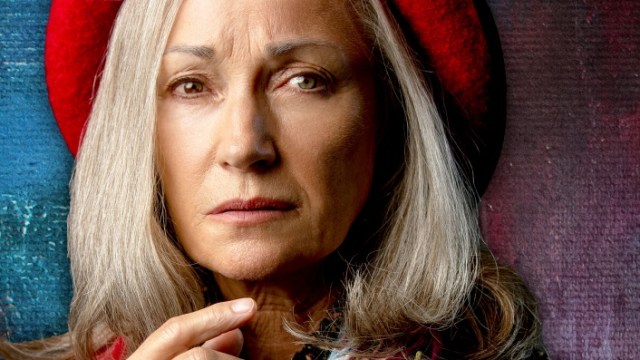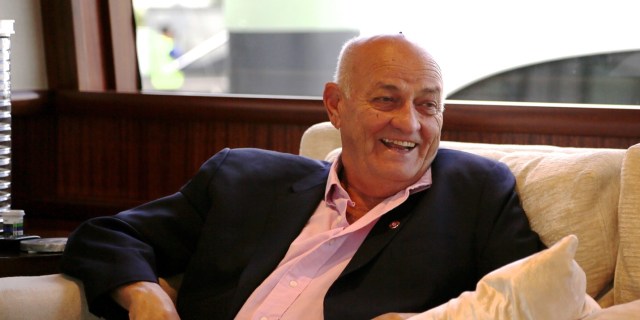
While dementia is a growing problem, more common in older Australians, it is not a normal part of ageing. It can be treated as an embarrassing “ailment”, with sufferers isolated from family and friends. There is no cure, but compassion, understanding and education are key.
A poignant tale hit our cinema screens in late February. In Ruby’s Choice, you may have to blink twice to recognise Golden Globe-winning film, theatre and TV actress Jane Seymour, OBE – the one-time Bond girl (Solitaire in the 1973 movie Live and Let Die, with Sir Roger Moore) or from iconic TV roles in Dr Quinn Medicine Woman and mini-series East of Eden.
Ruby’s Choice was financed by renowned Australian philanthropist Sir Owen Glenn through the Glenn Family Foundation. He pledged 50 per cent of profits to be donated to dementia research.

“Dementia is a growing problem which gets very little attention from the community at large,” Sir Owen said. “It is treated as an embarrassing ailment and sufferers are isolated from family and friends.”
A drama with comedic overtones, the movie tells the story of Ruby, a loving grandmother who suffers from dementia, and follows three generations of strong Australian women.
Jane, 71, signed on for the project because of a personal connection with dementia. In 2014 she served as executive producer on the award-winning documentary film Glen Campbell: I’ll Be Me, which told the story of the country music legend dealing with the effects of Alzheimer’s disease during his farewell tour in the US, Australia and Europe.
She also drew on family experiences to play Ruby, over the past few years having been an avid campaigner raising money for Alzheimer’s research charities since losing her uncle and ex-husband’s aunt to the devastating condition.
The actress has since become a global honorary ambassador for the Australian charity Dementia Foundation for Spark of Life – the official charity partner for the film.

“A lot of movies have been made about dementia and Alzheimer’s and they are downright depressing,” Jane says. “Ruby’s Choice is different. Its message is a positive one.
“Yes, it portrays a depressing, devastating side but it is done with humility and humour. It shows how a family deals with it.
“It’s about a woman with dementia, and about family, and how they deal with it. It’s three generations having to help her, trying to live with her and her circumstances and making choices for her.
“[Sufferers] need to be heard, especially with dementia. You just have to be compassionate. You can’t fix them.”
Ruby’s Choice is for all ages because it explores the challenges we all face.
Jane called it the “long goodbye”, and that went tend to forget that people with dementia are still human, who still need to be loved, accepted and included in society.

Shot in Sydney and regional NSW during the first COVID-19 wave of 2020, Ruby’s Choice premiered in late August 2021 at the CinefestOZ festival in Margaret River, Western Australia.
Jane says it was “a sad and scary place to put [herself] as an actress”.
“I have a lot of family members who’ve had dementia and Alzheimer’s, so I’ve been around that world,” she says. “When you play someone who has it, and you realise the fear they have when they don’t know what’s happening or what’s going on, it’s terrifying.
“But at the same time, in Ruby’s case, she mends the hearts of everyone in her family.
“[Ruby] loses her ability to know where the bathroom is – that is a really big one. She gets lost.
“In the middle of the night she starts crying and thinking that her husband, who’s long since dead, is in the bed next to her, and actually it’s her granddaughter Tash (played by Coco Jack Gillies).”
Directed by Michael Budd, the film begins with an elderly Ruby living alone with undiagnosed dementia.
After accidentally burning down her house, she’s forced to move into her daughter’s crowded home, where Sharon (played by Jacqueline McKenzie) and her family’s dynamics shift as they navigate their way through daily life.

Her teen granddaughter, Tash (Coco Jack Gillies) is forced to share her bedroom with her grandmother and goes from hating to loving her as she learns more about some family secrets.
She doesn’t necessarily know she’s doing it, but Ruby’s family’s “elephants in the room” are solved.
“Dementia is a really tricky topic to discuss in film,” says Michael Budd. “As the director of Ruby’s Choice, I drew on my personal experiences interacting with people with dementia, including my grandmother.
“My aim was to carefully portray dementia in a highly accurate and respectful way.
“We worked incredibly hard to pull Ruby’s Choice together throughout the pandemic because it is a story so close to our hearts and an important one to get out into the public arena.”

REIGNITING THE SPARK OF LIFE
Dementia Care International is an independent Australian-based organisation supporting leaders around the world to provide excellence in dementia care.
This is achieved through specialised education on the Spark of Life philosophy and through implementation of the best practice Spark of Life Model of Care.
The Model focuses on building relationships based on empathy, kindness, and compassion, with unprecedented benefits for all involved, says Hilary Lee, President of Dementia Care International.
The team at Dementia Care International works closely with its global network of Spark of Life Master Practitioners on five continents supporting them in their sustainable implementation of the Spark of Life Model of Care.
Dementia Care International was founded in 1993 by Jane Verity with the purpose to humanise dementia care: to reignite the Spark of Life.
The Spark of Life Education is complementary to other education provided in that it fills a gap of practical skills on the psychosocial side of care – of building relationships based on compassion, empathy and kindness that transform the experience both for the staff and the residents – preventing Sundown Syndrome, angry, aggressive behaviours, the need for psychotropic medication, reducing falls and improving the cognitive abilities.
Spark of Life Education provides user-friendly knowledge and skills to enrich the lives of everyone in aged and community care including palliative care, and hospital services.
The education is systematic and gives staff the skills to enrich the lives of people with dementia as well as of each other thereby developing a genuinely caring community.
Staff build their confidence, learning how to enable even people who have severe dementia the freedom and ability to make everyday choices and continue to live life with the greatest amount of enjoyment.

ABOUT DEMENTIA
According to Health Direct, dementia is a condition that affects a person’s thinking, memory, their behaviour, and ability to perform everyday tasks.
According to the organisation: “While dementia is more common in older Australians, it is not a normal part of ageing.
“See a doctor for a full assessment if you or a loved one experiences memory loss, difficulty with familiar tasks, language problems or changes in mood or personality.
“There is no cure for most kinds of dementia, but empathy and trust, communication approaches and some medications can help slow deterioration and improve quality of life.
“Caring for someone with dementia can be difficult – even overwhelming – so if you are a career, make sure you seek help and look after yourself, too.
“Dementia is not one specific disease, but a collection of symptoms of a long-term brain disorder such as Alzheimer’s disease or vascular dementia.
“It affects around 1 in 15 Australians aged 65 and over. While dementia is more common in older people, it is not considered a normal part of ageing.
“People in their 40s and 50s can sometimes get dementia as well. This is known as younger onset dementia.”
www.healthdirect.gov.au/dementia-overview








